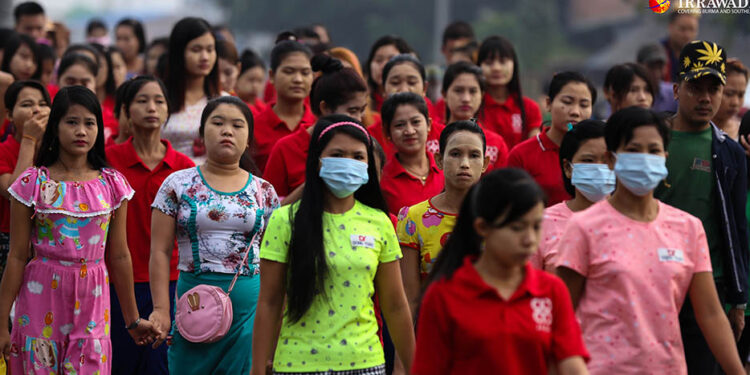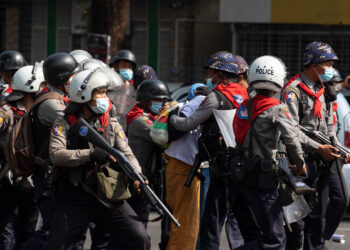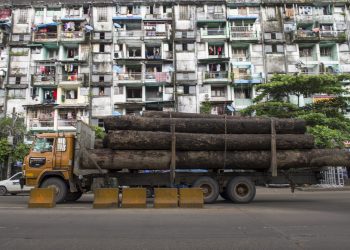The European Union will provide 5 million euros (7.9 billion kyats) as an emergency fund to support female workers in Myanmar’s garment sector who are impacted by COVID-19, starting next month.
The emergency fund, named the Myan Ku Fund, meaning “quick assistance” in Burmese, will provide direct cash transfers to 100,000 or more female workers. The fund will transfer the deposits into the workers’ mobile accounts, as the transfer will be made directly with Wave Money, according to EU Ambassador to Myanmar Kristian Schmidt.
The support will begin on May 1 and last three months, with amounts ranging from 75,000 to 125,000 kyats (US$52.65-87.75). The fund will support garment workers employed in locally owned, joint venture and foreign-owned factories.
The EU has been the largest trading partner for Myanmar’s garment sector since its markets opened to Myanmar in 2011. The sector is regarded as an immense success with Myanmar selling 70 percent of its garment exports to Europe.
But as of the end of March, according to the EU ambassador, over 25,000 workers from more than 40 factories have been laid off as Myanmar’s formerly booming garment industry grapples with the devastating economic impact of COVID-19. According to estimates provided by the EU, half of the 700,000 garment workers in the country, most of whom are female, are at great risk of either being suspended without pay or losing their jobs permanently.
Through consultation with trade unions and local civil society organizations, the EU is aiming to deliver the majority of its support to workers who lost their jobs or whose contracts were illegally terminated. The EU is also supporting workers at factories of small and medium-sized enterprises (SMEs) whose employers want to retain them.
“Eighty percent of the fund will go to women who have lost their jobs or been evicted from the hostels where they are staying. They are potentially out in the street and that is something we want to avoid,” said Schmidt. He said some 80,000 workers will be given 75,000 kyats per month for three months.
The Myan Ku fund will also allocate 125,000 kyats per month to workers who were illegally fired by companies that shut down or left the country and have not been paying their workers. The fund has prepared to support up to 8,000 women in this category.
The fund will also help pay the salaries of female workers at companies and factories that want to retain them through the pandemic, but currently don’t have work for them. This support will go to about 5,000 workers. The EU will work to match the salaries they are currently paid.
The EU has partnered with the United Nations Office for Project Services (UNOPS), Nexus Response for Myanmar, Myanmar labor unions, SMART Textile & Garments and the Myanmar Garment Manufacturers Association. Together, the groups have initiated the emergency fund program and will provide support to workers “without discrimination,” said the EU ambassador, because the coronavirus does not discriminate against anyone either.
Factory worker Ma Thandar Oo was among nearly a thousand workers who were laid off in March due to the closure of her factory in Yangon Hlaing Thar Yar Industrial Zone.
She said she was curious whether they will be eligible for the Myan Ku Fund.
“We want the support if they can provide it,” she said. “We returned to our homes as we could not pay the hostel fee, but we are hopeless because we heard that the support will not come if we have farms, a sweatshop or a boat. We have a boat, bought with loan money. But we are hopeless now.”
“This Myan Ku emergency cash fund will be a critical lifeline to these vulnerable workers and their families as they face the extremely challenging months ahead,” said Daw Khine Khine Nwe, the secretary general of the Myanmar Garment Manufacturers Association.
She added that some 58,000 workers across Myanmar are currently jobless since many factories have closed.
Turnover of labor in the garment sector is normally between 10 and 25 percent. Due to the impacts of COVID-19, with a shortage of raw materials and companies unable to continue operations, there is a very high chance of workers losing their jobs, according to Daw Khine Khine Nwe.
“We expect to see more [workers laid off] this April,” she added.
You may also like these stories:
Latest COVID-19 Developments in Myanmar: April 8, 2020
Latest COVID-19 Developments in Myanmar: April 7, 2020
Latest COVID-19 Developments in Myanmar: April 6, 2020

















